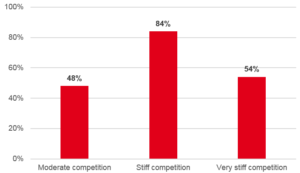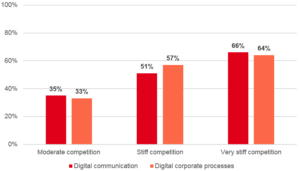 Digitization is keeping the staffing industry on its toes, despite and due to great competitive pressure. Based on a survey, swissstaffing examined the interplay between competition and innovation in the industry.
Digitization is keeping the staffing industry on its toes, despite and due to great competitive pressure. Based on a survey, swissstaffing examined the interplay between competition and innovation in the industry.
Digitization and competitive pressure are leaving traces on the corporate landscape around the world. The staffing industry is no exception. Given the stiff competition and narrow margins, it is no easy task for staffing service providers to balance innovation and competitive prices. Less competition, more innovation? Competition could also be the trigger for constant renewal. A new study by swissstaffing suggests that competition keeps companies fit when it comes to digitization.

Figure 1: Share of companies that have undertaken a digitalization project in % depending on competitive intensity
Mainspring for innovation projects
Based on a survey, swissstaffing examined the interplay between competition and innovation for staffing service providers in Switzerland. We asked 129 companies about their state of digitization and their competitive situation. A central question for measuring a company’s innovative power: Has the staffing service provider undertaken a digitization project in the last five years? Managing directors who described the competition on the market as “stiff” were by far the most innovative. In this group, 84% said they had undertaken a digitization project. With “very stiff” market competition, the project rate fell to 54%. Innovation activity was still lower at companies with only “moderate” competitive pressure. Only 48% undertook a digitization project in the last five years. Therefore, with respect to innovation, the staffing industry is following a well-known pattern in economics. Competition is essentially good for keeping a company fit and innovative. If competitive pressure becomes too great, frequently the financial means and time required to initiate innovation projects are lacking. By contrast, if there is little market pressure, the incentive to innovate is lacking.
Digitization as attitude
However, digital transformation in the staffing industry is more complex. In many areas, digitization is less a question of projects and investments than a question of attitude. Thanks to social media and specialized providers of software solutions, the possibilities of the digital world are available to companies at low cost. They are automatically integrated into regular updates, they can be purchased à la carte or even used for free. The greater the competitive pressure, the faster the staffing service providers must take advantage of these opportunities in order to win the battle for customers and candidates. Our statistical evaluation confirms this. Using machine learning methods, two indicators are being developed from a multitude of questions about the state of digitization and usage behavior of digital offerings. One indicator measures how much companies are using new media; the other, how digitized internal company processes are. Figure 2 shows the share of tech-savvy companies depending on the degree of competition. As expected, this share increases continuously with the intensity of competition.
Dynamic service provider networks as a success model
As much as competition may be experienced as a limiting factor in the innovation process, it is definitely more a motor than a brake for innovation. Excessively strong market pressure can actually cause staffing companies themselves not to become innovators. However, insofar as third parties introduce innovations, competition ensures the rapid spread of new technology and keeps the industry with the pulse of the times. For the HR world, this is significant since company-internal HR departments are less obviously under competitive pressure. Therefore, cooperation with staffing service providers is a valuable addition in order to remain up-to-date with recent developments. This is an important reason why dynamic-innovative service provider networks will leave their mark on staffing in the future.









